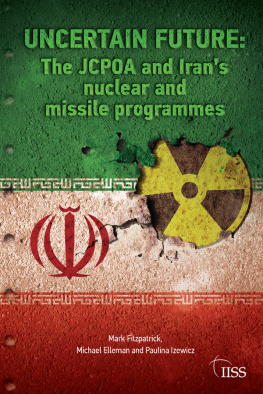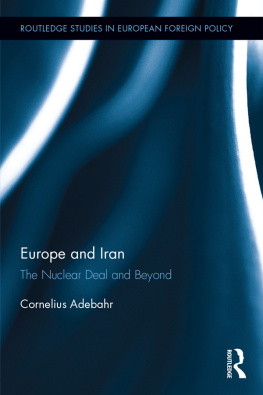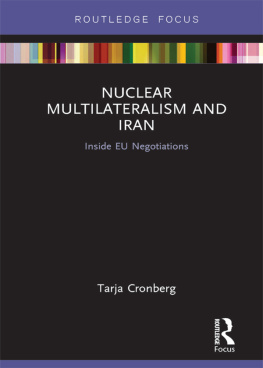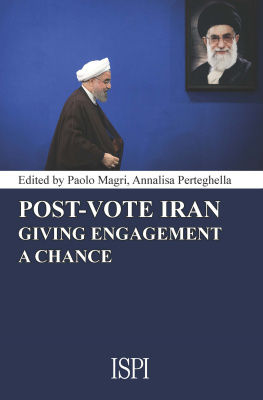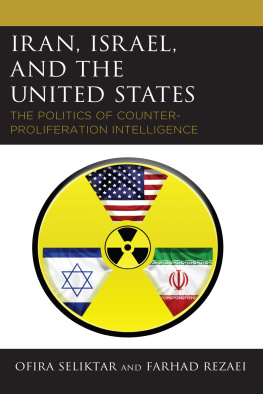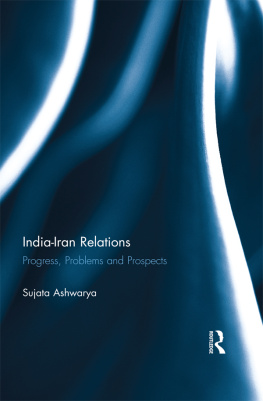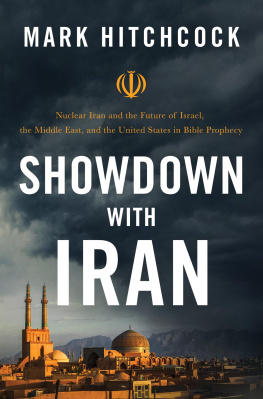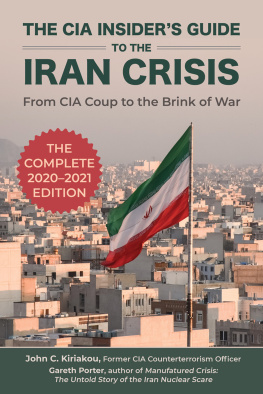Uncertain future: The JCPOA and Irans nuclear and missile programmes
Mark Fitzpatrick,
Michael Elleman and Paulina Izewicz
Uncertain future: The JCPOA and Irans nuclear and missile programmes
Mark Fitzpatrick,
Michael Elleman and Paulina Izewicz
The International Institute for Strategic Studies
Arundel House | 6 Temple Place | London | WC2R 2PG | UK
First published January 2019 by Routledge
4 Park Square, Milton Park, Abingdon, Oxon, OX14 4RN
for The International Institute for Strategic Studies
Arundel House, 6 Temple Place, London, WC2R 2PG, UK
www.iiss.org
Simultaneously published in the USA and Canada by Routledge
52 Vanderbilt Avenue, New York, NY 10017
Routledge is an imprint of Taylor & Francis, an Informa Business
2019 The International Institute for Strategic Studies
DIRECTOR-GENERAL AND CHIEF EXECUTIVE Dr John Chipman
EDITOR Dr Nicholas Redman
ASSISTANT EDITOR Sam Stocker
EDITORIAL Alex Goodwin, Jill Lally, Gaynor Roberts
COVER/PRODUCTION John Buck, Kelly Verity
COVER IMAGE: Adobe Stock
The International Institute for Strategic Studies is an independent centre for research, information and debate on the problems of conflict, however caused, that have, or potentially have, an important military content. The Council and Staff of the Institute are international and its membership is drawn from almost 100 countries. The Institute is independent and it alone decides what activities to conduct. It owes no allegiance to any government, any group of governments or any political or other organisation. The IISS stresses rigorous research with a forward-looking policy orientation and places particular emphasis on bringing new perspectives to the strategic debate.
The Institute's publications are designed to meet the needs of a wider audience than its own membership and are available on subscription, by mail order and in good bookshops. Further details at www.iiss.org.
All rights reserved. No part of this book may be reprinted or reproduced or utilised in any form or by any electronic, mechanical or other means, now known or hereafter invented, including photocopying and recording, or in any information storage or retrieval system, without permission in writing from the publishers.
British Library Cataloguing in Publication Data
A catalogue record for this book is available from the British Library
Library of Congress Cataloging in Publication Data
ADELPHI series
ISSN 1944-5571
ADELPHI 466467
ISBN 978-0-367-19705-6
Contents
Mark Fitzpatrick is Associate Fellow at the International Institute for Strategic Studies (IISS). Until the end of 2018, he was Executive Director of IISSAmericas and Director of the Institutes Non-Proliferation and Nuclear Policy programme. Prior to joining the IISS in 2005, he was a career US Foreign Service Officer. He helped to shape and implement US policy on the Iran nuclear issue in several different roles, including as Deputy Assistant Secretary for Non-Proliferation (acting).
Michael Elleman is Senior Fellow for Missile Defence at the IISS and the principal author of the IISS Strategic Dossier Irans Ballistic Missile Capabilities: A net assessment, as well as numerous articles on missile proliferation. He previously worked as a missile expert for weapons-inspection missions in Iraq, and spent two decades as a scientist at Lockheed Martins Research and Development Laboratory.
Paulina Izewicz is Senior Research Associate at the James Martin Center for Nonproliferation Studies with the Middlebury Institute of International Studies at Monterey. Until spring 2018, she managed programmatic work on sanctions and led a Track 1.5 dialogue with Iran for the IISS. She has also worked as a Research Associate at the Institute for Science and International Security in Washington DC, where she focused on the technical aspects of Irans nuclear programme.
AEOI Atomic Energy Organization of Iran
E3 France, Germany and the United Kingdom
E3/EU+3 France, Germany, the UK and the European Union High Representative, plus China, Russia and the United States. See also the P5+1
HEU highly enriched uranium
IAEA International Atomic Energy Agency
IRGC Islamic Revolutionary Guard Corps
JCPOA Joint Comprehensive Plan of Action
LEU low-enriched uranium
MTCR Missile Technology Control Regime
NPT Treaty on the Non-Proliferation of Nuclear Weapons (Non-Proliferation Treaty)
NSG Nuclear Suppliers Group
PMD possible military dimension
PWG Procurement Working Group
P5+1 France, China, Russia, the UK and the US plus Germany. See also the E3/EU+3
UNSCR United Nations Security Council Resolution
WMD weapons of mass destruction
Mark Fitzpatrick
Only three and a half years after its adoption, the Joint Comprehensive Plan of Action (JCPOA), which aimed to obstruct Irans potential pathways to nuclear-weapons development, is in danger of falling apart. The agreement, better known as the Iran nuclear deal, was widely hailed throughout the world when it was agreed on 14 July 2015, following negotiations between Iran on one side, and the five permanent members of the United Nations Security Council (China, France, Russia, the United Kingdom and the United States) and Germany collectively known as the P5+1 on the other, with the European Union chairing. Diplomacy had forestalled both an Iranian nuclear weapon and military action against Iran that some saw as the default means of preventing the development of such a weapon.
Acclaim for the diplomatic achievement was not universal, however. In the US, perceptions of the nuclear deal were divided along partisan lines. With a few exceptions, Democrats were elated at what their standard-bearer, President Barack Obama, had been able to accomplish. Republicans, on the other hand, believed the JCPOA made too many concessions to Iran, and that additional pressure on Irans economy could have achieved stronger constraints. Israel and three Arab foes of Iran Bahrain, Saudi Arabia and the United Arab Emirates also disapproved. From their perspective, the deals legalisation of Irans nuclear programme was less contentious than the fact that it legitimised Iran as a nation-state, and they feared that Tehran would gain influence and strength across the Middle East.
As the Republican candidate in the 2016 presidential election, Donald Trump made his opposition to the JCPOA a key campaign issue, calling it the worst deal ever and vowing to terminate the agreement if elected. It took Trump 18 months to fulfil this election promise: in part because Iran was honouring its commitments but also because his key advisers recognised that withdrawing from the deal would serve no strategic purpose. As more hawkish advisers took over in early 2018, they encouraged Trumps inclination to overturn his predecessors signature foreign-policy achievement. On 8 May 2018, Trump ceased waiving sanctions as required under the JCPOA and announced his decision to withdraw from the deal altogether. This left it up to Iran to decide whether to continue to uphold its end of the agreement in exchange for uncertain economic benefits from the remaining parties to the deal trade and investment that was coming under sharp pressure from an aggressive US extraterritorial sanctions campaign.

